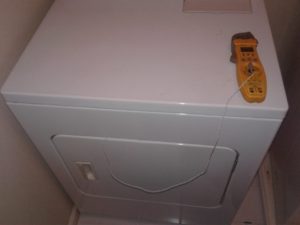There’s no heat
It takes too long to dry
1. No power to the dryer
Make sure there’s power getting to the dryer. Check for a tripped circuit breaker or a blown fuse. Check the wall socket for power with a voltmeter or by plugging something else in.
2. Door switch / Door switch actuator lever
The dryer would not start with a broken door switch. Replace the door switch if found defective.
Most dryers have a door switch actuator lever – when you close a dryer door, it presses against the lever, which actuates the door switch. If the lever is broken, the switch would not activate and the dryer would not start. Replace the lever, if broken.
Note: Door switch actuator lever usually comes with the door switch assembly and it is recommended to get the whole assembly since there is almost no price difference between the door switch assembly and just the lever. Check your model for more details.
3. Thermal fuse
Most dryers have a thermal fuse, which burns out when the dryer overheats, in which case the dryer will either not run at all or stop heating. The fuse is usually located on the vent duct, inside the dryer. A blown fuse will show no continuity when measured with a meter. Before replacing the fuse, make sure the blower wheel is not broken or clogged, and there is nothing blocking the venting.
Note: It is recommended by most dryer manufacturers to replace a hi-limit thermostat when replacing a thermal fuse.
4. Timer
Replace if defective (note: uncommon problem).

1. Gas valve coils
Igniter glows, then shuts off without igniting gas – the problem is probably with defective coils (black, located on top of the gas valve). It is recommended to replace all coils (usually two or three) if found defective.
Note: Sometimes the whole gas valve may be defective, thus not letting the gas out. However, this problem is not common.
2. Thermal fuse
Most dryers have a thermal fuse, which burns out when the dryer overheats, in which case the dryer will either not run at all or stop heating. The fuse is usually located on the vent duct, inside the dryer. A blown fuse will show no continuity when measured with a meter. Before replacing the fuse, make sure the blower wheel is not broken or clogged, and there is nothing blocking the venting.
Note: It is recommended by most dryer manufacturers to replace a hi-limit thermostat when replacing a thermal fuse.
3. Igniter
Igniter may burn out or break. Replace the igniter if found defective.
Note: Igniters are very fragile and break easily. It is recommended to handle the igniter only touching the ceramic part of it (usually white in color).
4. Flame sensor (or radiant heat sensor)
Replace the sensor (located near the igniter) if found defective.
Note: Normal drying time for a dryer is about 45 minutes (some may take up to an hour).
1. Venting
Make sure the dryer vent hose, as well as the rest of the vent duct, is not clogged.
Unless regular maintenance is performed, chances are there is a lot of lint accumulated inside the dryer. This might affect the drying time and could be a fire hazard. Make sure to have your dryer cleaned regularly. Because this might involve taking most of the dryer apart, it is recommended to have a qualified appliance repairman perform this task.
2. Thermostat
There are a couple of cycling thermostats inside the dryer. If one of them breaks down, it might affect the dryer’s performance. Replace the defective thermostat.

1. No power to the dryer
Make sure there’s power getting to the dryer. Check for a tripped circuit breaker or a blown fuse. Check the wall socket for power with a voltmeter or by plugging something else in. Sometimes the power cord disconnects or burns at the dryer, if this is the case, the wiring and the terminal block must be repaired or replaced.
2. Door switch / Door switch actuator lever
The dryer would not start with a broken door switch. Replace the door switch if found defective.
Most dryers have a door switch actuator lever – when you close a dryer door, it presses against the lever, which actuates the door switch. If the lever is broken, the switch would not activate and the dryer would not start. Replace the lever, if broken.
Note: Door switch actuator lever usually comes with the door switch assembly and it is recommended to get the whole assembly since there is almost no price difference between the door switch assembly and just the lever. Check your model for more details.
1. No power to the dryer
Make sure there’s power getting to the dryer. Check for tripped circuit breakers or blown fuses. An electric dryer uses two circuit breakers or fuses, and if only one of two is tripped or blown, the dryer might still run but not heat. Sometimes the power cord disconnects or burns at the dryer, if this is the case, the wiring and the terminal block must be repaired or replaced.
2. Heating element
A burned out heating element will show no continuity when measured with a meter. Replace the element if found defective.
3. Thermal fuse
Most dryers have a thermal fuse, which burns out when the dryer overheats, in which case the dryer will either not run at all or stop heating. The fuse is usually located on the vent duct, inside the dryer. A blown fuse will show no continuity when measured with a meter. Before replacing the fuse, make sure the blower wheel is not broken or clogged, and there is nothing blocking the venting.
Note: Normal drying time for a dryer is about 45 minutes (some may take up to an hour).
1. Venting
Make sure the dryer vent hose, as well as the rest of the vent duct, is not clogged.
Unless regular maintenance is performed, chances are there is a lot of lint accumulated inside the dryer. This might affect the drying time and could be a fire hazard. Make sure to have your dryer cleaned regularly. Because this might involve taking most of the dryer apart, it is recommended to have a qualified appliance repairman perform this task.
2. Thermostat
There are a couple of cycling thermostats inside the dryer. If one of them breaks down, it might affect the dryer’s performance. Replace the defective thermostat.
3. Heating element
A heating element might only be partially burned out, in which case it would still work but will take longer time to dry the clothes. Replace the element if found defective.